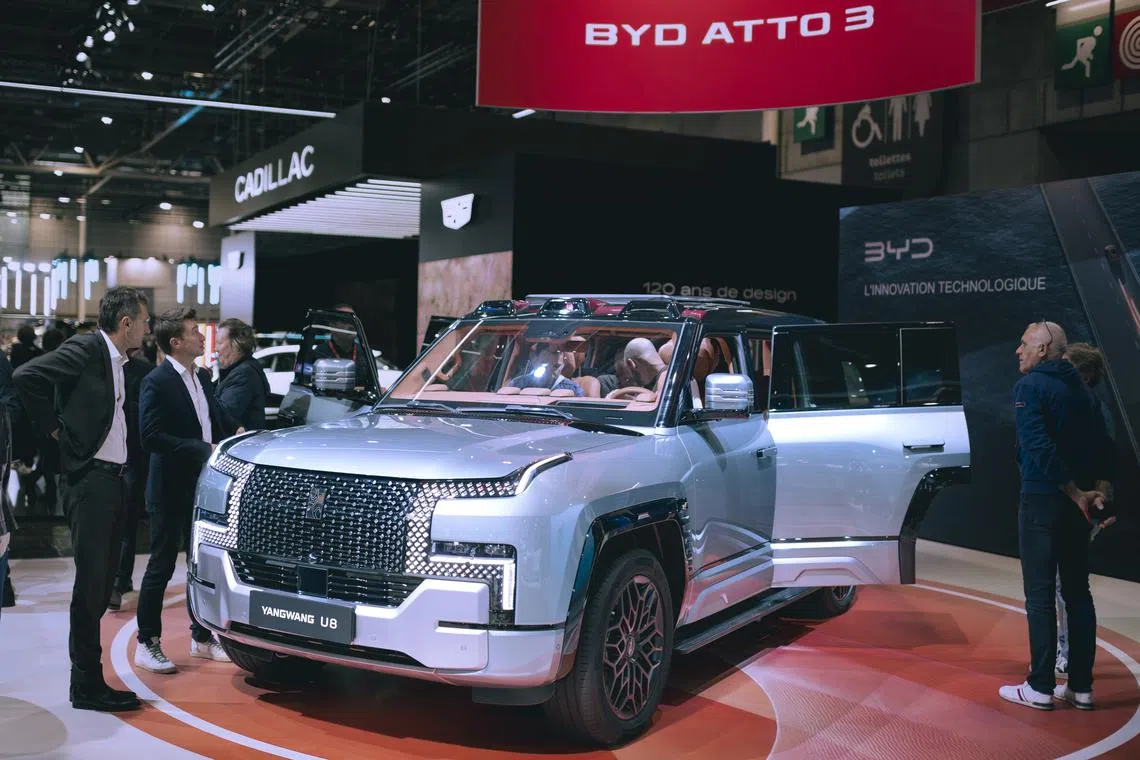China asks carmakers to halt Europe expansion over EV tariff spat, sources say
Sign up now: Get ST's newsletters delivered to your inbox

China’s directive, which is not a mandatory order, may fuel tensions as both powers vie for dominance of the automobile industry.
PHOTO: NYTIMES
Follow topic:
PARIS – China is pressuring its automakers to pause expansion in the European Union due to the escalating trade conflict over electric vehicles (EVs), people familiar with the matter said.
Beijing is telling manufacturers to put on hold active searches for production sites in the region and the signing of new deals, and to generally keep a low profile while negotiations over EU tariffs on Chinese EVs are ongoing,
State-owned Dongfeng Motor Group has already halted plans to potentially manufacture cars in Italy in response to the warnings, the people said.
China’s directive, which is not a mandatory order, may fuel tensions as both powers vie for dominance over the car industry.
Earlier in October, the EU voted to boost tariffs on made-in-China electric cars to as high as 45 per cent, arguing that Beijing provides unfair subsidies to its automakers.
China denies that claim and has threatened its own duties on European dairy, brandy, pork and car sectors.
While Dongfeng Motor told Italian officials that Rome’s support for the EU tariffs was the reason for its pivot, Beijing is also concerned about potential overcapacity due to Europe’s bumpy EV shift and poor demand for Chinese cars in the market, one of the people said.
Either way, the move is a setback for Italian Prime Minister Giorgia Meloni, who has tried to attract more automaking to the country as local manufacturer Stellantis reduces output.
Italian Enterprises Minister Adolfo Urso travelled to China in July, holding meetings with executives including from Dongfeng Motor to win the company’s investment. His trip was supposed to help formalise a deal between Dongfeng Motor and Italy during Ms Meloni’s visit to China later that month, but Beijing asked the automaker not to proceed, the people said.
It is not just Dongfeng Motor that is treading more carefully.
Chongqing Changan Automobile, a state-owned carmaker based in western China, cancelled an event to launch its brand in Europe, planned for this week in Milan, because the tariff negotiations are still ongoing, one of the people said.
The EU and China have pledged to work towards an alternative agreement that would avoid the need for levies.
A spokesperson for Mr Urso declined to comment. Representatives from Dongfeng Motor and Changan Automobile did not respond to requests for comment.
Representatives from China’s Ministry of Commerce also did not respond to a request for comment.
Chinese manufacturer Chery Automobile pushed back a goal to start building EVs at a plant it had taken over in Spain by one year to October 2025, as the company weighs the amount of work to be carried out at the Barcelona site following the EU’s tariff decision, Bloomberg reported in September.
Demand for battery-powered cars has suffered in Europe after several countries walked back subsidies. That has hit Chinese brands led by Nio and SAIC Motor’s MG, whose EV sales as a whole in the region fell by nearly half in August to the lowest level in 18 months.
Still, Europe remains attractive for China’s carmakers because they can generally command higher prices there than at home, where they have been locked in a painful EV price war.
BYD is pushing ahead with plans to build a factory in Hungary to help the maker of the Seal and Atto 3 electric cars sidestep EU tariffs.
It is also planning a US$1 billion (S$1.3 billion) plant in Turkey, which has a customs union agreement with the EU that would make BYD cars built there exempt from levies. BLOOMBERG

